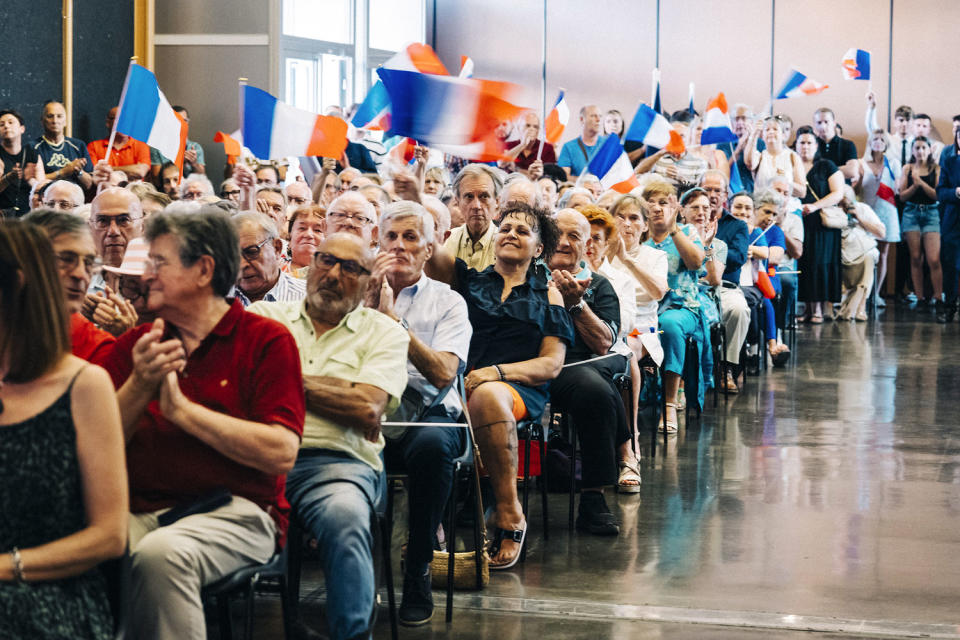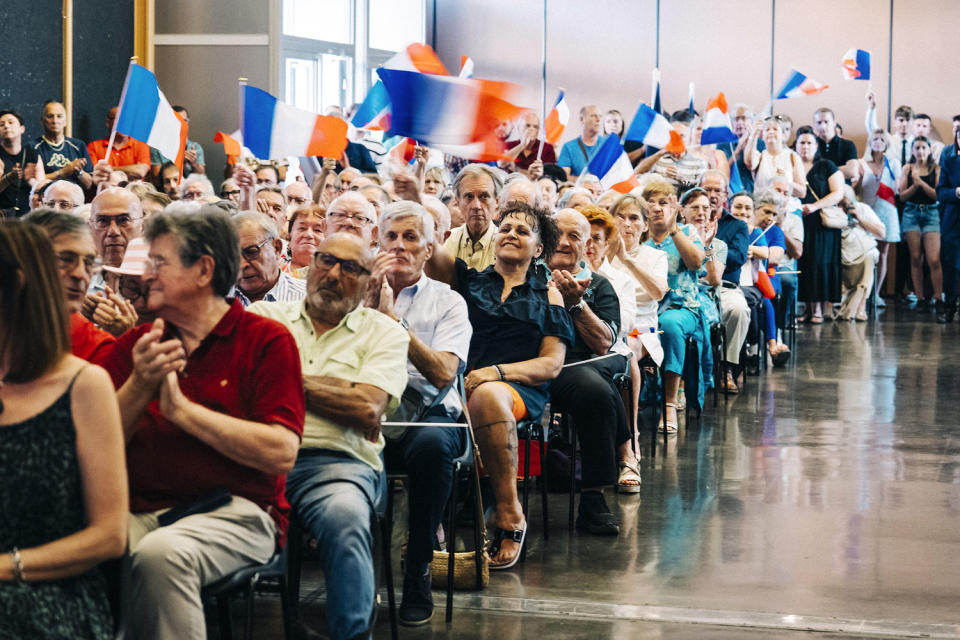National Rally is leading in the first round of voting in a high-stakes election that puts France on course for a far-right government for the first time since World War II.
Projections by polling agencies suggest that National Rally secured a third of the vote during Sunday’s first round of parliamentary elections. On the opposite end of the political spectrum, early polling suggests the leftist alliance, New Popular Front, has 29% of the vote. French President Emmanuel Macron’s centrists trailed third, with 20.5%.
Parties are competing for a total 577 seats in the National Assembly, the French equivalent of the U.S. House of Representatives. Those who polled above 12.5% of registered voters in their constituency but did not cross the 50% threshold will enter the run-off next week.

Macron called the snap election a day after his party was crushed by RN in June’s European parliamentary elections. His decision was widely seen as an attempt to spook voters away from the political extremes, but his gamble backfired after a lightning-fast, three-week campaign failed to turn the tide.
“The center has imploded,” Samantha de Bendern, a geopolitical consultant for the news outlet La Chaine Info, said before the election. “Macron miscalculated. He was hoping the moderate left and moderate right would both come to him. Instead, they’ve both joined the extremes.”
Macron shocked the world when he called the snap election under no obligation to do so, sparking the extraordinarily high-stakes vote that could bring France into political turmoil and leave his legacy in tatters.
Voter turnout on Sunday was at nearly 60% hours before polls closed, estimated to be the highest in the first round of parliamentary elections since 1986, according to Ipsos.
What’s next?
While first-round results offer a picture of overall voter sentiment, what the French National Assembly will be made up of remains to be seen as parties regroup, make alliances in some constituencies and pull out of others ahead of the runoff vote on July 7.
While RN will likely win the most votes in the first round, it will still require another surge in support ahead July 7 to secure the remaining contested seats.
What’s likely to emerge is a hung Parliament populated with adversaries from opposing parties, setting up the possibility of political paralysis and damaging inaction, making it far more difficult to pass new legislation and for any pending legislation to advance.
If there is no majority, Macron will be tasked with naming a prime minister from the parliamentary group with the most seats in the National Assembly. The prime minister serves as head of government and oversees much of the day-to-day domestic policy, while the president has control over foreign policy.
But the contentious composition of the government could turn this into a tumultuous process — a prime minister candidate can risk being overthrown through a no-confidence vote if other parties join together. France could be left without a prime minister as political parties jockey for power.
“Either we have no government, a technocratic government, or we haggle for months over who should be prime minister,” de Bendern said. “A year and one day after the dissolution of Parliament, Macron can call new parliamentary elections, so we will have a year of chaos.”
But the second round of voting is more difficult to predict, as voters who supported fringe parties in the first round could lend their votes to the leading parties.
Who are the far right?
National Rally is the party poised to claim the most votes, which falls in line with pre-election polls that showed a surge in support for the far right and left, and a collapse in support for the center.
The standard-bearer for the party in these elections is Jordan Bardella, a clean-cut, media-savvy 28-year-old. A loyal protégé of Marine Le Pen, the party’s leader, Bardella was voted party president in 2022. (Le Pen is believed to be angling for the French presidency in 2027). With Bardella front and center, National Rally wrenched power from the center during this month’s EU parliamentary elections.
Bardella had pledged to fight a “cultural battle” against Islam, opposed immigration, promoted a platform of “France for the French,” and supported policies that benefit the working class — a rebuke of some of Macron’s most controversial policies, including pension reform and abolishing a tax on France’s richest.
The party has also gained supporters after Marine Le Pen began steering it away from its roots as an extreme ethnocentric party, as it was under her father, Jean-Marie Le Pen, its founding president who led the party until 2011.
As leader of what was originally called the National Front, the elder Le Pen was openly racist and was convicted multiple times of making antisemitic comments and dismissing the Holocaust as a “detail” of history.
Still, some members of RN continue to express racist, antisemitic or homophobic views, and according to a report published Thursday by the French National Consultative Commission on Human Rights, 54% of RN supporters described themselves as racist.
The far right has long been on the cusp of power. In 2017, Marine Le Pen came in second to Macron for the presidency. Macron beat her handily then, but by 2022, he did so with a smaller majority, with Le Pen winning 41.45% of the vote in the runoff.
Anne Hidalgo, mayor of Paris and a member of the Socialist Party, says she fears for her country’s future in the face of such extremism, calling Le Pen a huge risk.
“People in France say we don’t have experience with these people, but we had the experience during the Second World War. … It is a very, very big risk for democracy, for minorities, for women,” she told NBC News, referring to France’s Vichy government during World War II, which collaborated with the Nazis.
What does this mean for Macron?
With his presidential term running until 2027, Macron is not on the ballot, and he said he would stay in office regardless of the outcome of the election. He now appears likely to do so under a cloud of political embarrassment, humbled by a fraught power-sharing arrangement.
With Macron’s centrists at a distant third in the first round, his next job may well be appointing a potentially adversarial prime minister from an opposing group.
During these power-sharing periods, the president is often relegated to a secondary role. The prime minister and Parliament are in charge of the country’s domestic policy, leaving the president with very limited power to block policies emanating from the government.
The president traditionally maintains control of national defense and foreign affairs, but the French Constitution does not offer a clear demarcation of power.
Bardella has said he would turn down the chance to be prime minister if voters do not hand his party an absolute majority, but it remains to be seen whether party leader Le Pen would allow him to turn down power should RN come so close.
The far-left coalition has not publicly announced the selection of a candidate for prime minister, though high-profile figures on that end of the ideological spectrum include Manuel Bompard of the hard-left France Unbowed party and the Socialist Party’s Raphaël Glucksmann.
How such political turbulence may affect the Olympics, which begin in Paris less than three weeks after the runoff, appears to be another error in Macron’s timing.
While the Olympics are ordinarily a unifying celebration of diversity, they may well take place under an overtly xenophobic government, or no government at all.
This article was originally published on NBCNews.com
EMEA Tribune is not involved in this news article, it is taken from our partners and or from the News Agencies. Copyright and Credit go to the News Agencies, email news@emeatribune.com Follow our WhatsApp verified Channel





